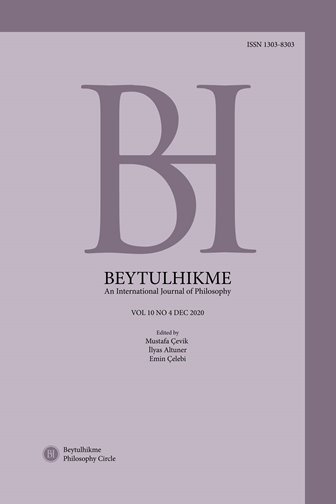Author :
Abstract
Frank Jackson’un siyah beyaz bir ortamda yaşayan ve parlak bir sinirbilimci olan Mary hakkındaki düşünce deyine dayanan, bilgi argümanı, fizikalist zihin anlayışına en önemli meydan okumalardan biridir. Argüman kısaca, dünyanın eksiksiz fiziksel bilgisinin, deneyimlerin fenomenal niteliklerini kapsamadığını bu nedenle fizikalizmin yanlış olduğunu göstermeyi amaçlar. Fizikalist karşıtı tezine ek olarak Jackson, deneyimlerin fenomenal niteliklerinin epifenomenal olduğunu iddia eder. Öte yandan, nedensel bir bilgi kuramına dayanan tutarsızlık itirazına göre, bilgi argümanı epifenomenalizmi çürütür, zira fenomenal deneyimin bilgisini elde etmenin, fenomenal deneyimlerin nedensel olarak etkin olmalarını gerektirdiğini ifade eder. Ancak, bu itiraza fenomenal deneyime nedensel bir işlev atfetmeyen nedensel bir bilgi kuramı geliştirerek karşı çıkmak mümkündür. Bu çalışmada, “güvenilirlik” ve fenomenal deneyim ve bilginin “ortak nedensel kökeni” nosyonları temelinde, nedensel bir bilgi kuramının mümkün olduğu ve bu nedenle epifenomenalizm ve bilgi argümanının zorunlu olarak tutarsız olmadığı iddia edilecektir.
Keywords
Abstract
Frank Jackson’s knowledge argument, which is based on a thought experiment about Mary, a brilliant neuroscientist, living in a black and white surrounding, is one of the most important challenges for physicalistic conceptions of the mind. The argument roughly aims at indicating that a complete physical knowledge of the world, would not include the knowledge of phenomenal properties of experience, therefore physicalism is false. In addition to his anti-physicalist thesis, Jackson further claims that phenomenal qualities of experiences are epiphenomenal. However, according to the inconsistency objection that is based upon a causal theory of knowledge, the knowledge argument undermines epiphenomenalism, because gaining the knowledge of phenomenal experience requires that phenomenal states are causally potent. However, the criticism can be challenged by developing a causal account of phenomenal knowledge without attributing a causal function of phenomenal properties. In this paper, it will be claimed that such a causal account is possible based on the notions of “reliability” and of “common causal origin” phenomenal experience and phenomenal knowledge, hence that epiphenomenalism and the knowledge argument are not necessarily inconsistent.
Keywords
- Arıcı, M. & Toy, P. (2015). The Ontology and Developmental Root of the First- Person Perspective. GSTF Journal of General Philosophy, 1 (2), 1-6.
- Braddon-Mitchel, D. & Jackson, F. (2007). Philosophy of Mind and Cognition. Oxford: Blackwell.
- Campbell, N. (2003). An Inconsistency in the Knowledge Argument. Erkenntnis, 58 (2), 261-266.
- Çağatay, H. & Ekemen, C. (2011). Mary’nin Odası ve Fizikalizm. Felsefe Tartışma- ları, 47, 26-33.
- Chisholm, R. (1966). Theory of Knowledge. London: Prentice-Hall.
- Gettier, E. L. (1963). Is Justified True Belief Knowledge? Analysis, 23 (6), 121-123.
- Goldman, A. I. (1967). A Causal Theory of Knowing. The Journal of Philosophy, 64 (12), 357-372.
- Goldman, A. I. (1979). What is Justified Belief? Justification and Knowledge. (Ed. G. Pappas). Dordrecht: D. Reidel, 1-23.
- Jackson, F. (1982). Epiphenomenal Qualia. Philosophical Quarterly, 32, 127-136.
- Jackson, F. (1986). What Mary Didn’t Know. Journal of Philosophy, 83, 291-295.
- Lewis, D. (1983). Postscript to ‘Mad Pain and Martian Pain’. Philosophical Papers, vol. 1. (Ed. D. Lewis). Oxford: Oxford University Press, 130-132.
- McEvoy, M. (2014). Causal Tracking Reliabilism and the Gettier Problem. Synthe- se, 191 (17), 4115-4130.
- McLaughlin, B. P. (1994). Epiphenomenalism. A Companion to the Philosophy of Mind. (Ed. S. Guttenplan). Oxford: Blackwell, 277-288.
- Nagasawa, Y. (2010). The Knowledge Argument and Epiphenomenalism. Er- kenntnis, 72 (1), 37-56.
- Stjernberd, F. (1999). Not So Epiphenomenal Qualia or, How Much of a Mystery is the Mind? https://www.lucs.lu.se/spinning/categories/language/Stjernberg/Stjernberg.pd f.
- Watkins, M. (2015). The Knowledge Argument Against the Knowledge Argu- ment. Analysis, 49, 158-160.





